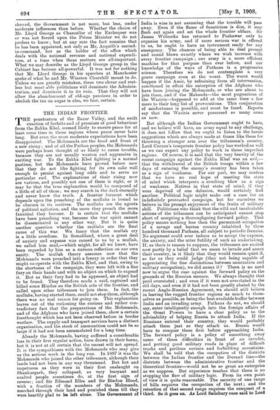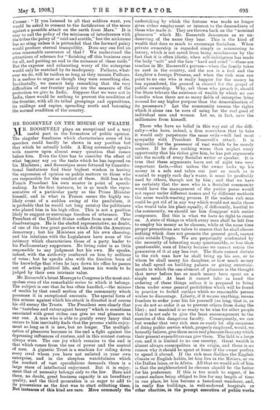THE INDIAN FRONTIER.
THEpenetration of the Bazar Valley, and the swift exaction of forfeits and of promises of good behaviour from the Zakka Khel, seemed likely to ensure peace for at least some time in those regions where peace never lasts long. But even the most moderate expectations have been disappointed. The Mohmands are the head and front of a new rising ; and of all the Path= peoples, the Mohmands were perhaps least thought of as likely to cause trouble, because they are not usually wanton and aggressive in exciting war. To the Zakka Khel fighting is a normal pastime, but the• Mohmands have proved before now that they do not like fighting for its own sake well enough to persist against long odds and to serve no particular end. The explanations of their rising now are various, and possibly not one of them is right, or it may be that the true explanation would be composed of a little of all of them ; we may search in the dark eternally and never know the truth. A frontier ferment which depends upon the preaching of the mullahs is bound to be obscure in its motives. The mullahs are the agents of political agitation, and the more they preach the more fanatical they become. It is certain that the mullahs have been preaching war, because the war spirit cannot be disseminated in any other way. But it is quite another question whether the mullahs are the final cause of this war. We fancy that the mullah cry is a little overdone. In Somaliland, where a great deal of anxiety and expense was caused to us by a mulish, we called him mad,—which might, for all we know, have been regarded by him as a curious reflection on our own sanity. The mulish theory assumes now that the Mohmands were preached into a frenzy in order that they might co-operate with the Zakka Khel, and that, owing to the shortness of the campaign, they were left with a fine fury on their hands and with no object on which to expend it. But as their fury had to be appeased, an object had to be found: They therefore made a raid, captured and killed some Hindus on the British side of the frontier, and called upon other tribesmen to join them. In fact, the mullahs, having started them, could not stop them, although there was no real reason for going on. This explanation leaves out -of the reckoning the curious and rather con- tradictory fact that the preparations of the Mohmands, and of the Afghans who have joined them,- show a certain, forethought which has not been observed before in border warfare. The supply and transport services have a distinct organisation, and the stock of ammunition could not be so large if it had not been accumulated for a long time. • Already the Mohmands, having suffered a considerable loss in their first regular action, have drawn in their horns, but it is'not at all certain that the unrest will not spread. It is the sympathisers with the Mohmands who may give us the 'serious work in the long run. In 1897 it was the Mohmands who joined the other tribesmen, although their lands had not been in any way threatened. But hot and impetuous as they were in their first onslaught on Shankargarh, they collapsed, as very buoyant and exalted people sometimes do, at the first sign of reverse ; and Sir Edmond Elles and Sir Bindon Blood, with a fraction of the numbers of the Mohmands, marched through their land and punished them till they were heartily glad to be left alone. The Government of India is wise in not assuming that the trouble will pass away. Even if the flame of fanaticism is dim, it may flash out again and set the whole frontier ablaze. Sir Tames Willcocks has returned to Peshawar only to organise his army, and if more serious war is offered to us, he ought to have an instrument ready for any emergency. The chances of being able to deal prompt and sound blows exactly where we wish increase with every frontier campaign ; our army is a more efficient machine for that purpose than ever before, and our knowledge of the ways of Pathans is a progressive science. Therefore we do not contemplate a very grave campaign even at the worst. The worst would happen if the Amir, by refraining from all intervention, sanctioned in effect the enterprise of the Afghans who have been joining the Mohmands, or who are about to join them, and if -the Mahsuds—the most pugnacious of the Waziris—happened to add at the same time a few more to their long list of provocations. This conjunction of misfortunes is possible, and must be faced. Reports say that the Waziris never possessed so many arms as now.
But although the Indian Government ought to have, and we believe will have, an army equal to any challenge, it (lees not follow that we ought to listen to the heroic suggestions which are always made at times like, these for throwing a stronger arm over the tribesmen's country. Lord Curzon's temperate frontier policy has worked as well as we can expect any policy to work in those imperfect regions. Of course, it is said that the very brevity of the recent campaign against the Zakka Khel was an evil,— that the withdrawal of the British troops within a few days of entering the enemy's country has been taken as a sign of weakness. For our part, we may confess that we have no real hope of meeting the state of mind which interprets a crushing blow as a sign of weakness. Natives in that state of mind, if they were deprived of one delusion, would certainly find another. Political logic might make out a case for an indefinitely protracted campaign, but for ourselves we believe in the prompt enjoyment of the fruits of military skill. Politicians who think that the wild and incalculable actions of the tribesmen can be anticipated cannot stop short of accepting a thoroughgoing forward policy. That policy means nothing less than the permanent occupation of a savage and barren country inhabited by three hundred thousand Pathans, all subject to periodic frenzies. No argument could ever induce us to accept the expense, the anxiety, and the utter futility of such an undertaking. If, as there is reason to suppose, the tribesmen are excited now partly by a belief that we mean to invade and annex their country, is it likely that they would remain quiet if, so far as they could judge (they not being capable of appreciating the fine distinctions between annexation and military occupation), we did annex it? There is no need. now to argue the case against the forward policy on the grounds of the Russian menace. We always thought that peril overstated ; and even if it were not overstated in the old days, and even if it had not been greatly abated by the recent Anglo-Russian Agreement, we should still believe in leaving the rugged frontier regions as much to them- selves as possible, as being the best available buffer between India and an invading army. Pathans do not, we should say, enter intelligently enough into the foreign affairs of the Great Powers to have a clear policy as to the advisability of helping Russia to attack India. If the Russians entered their country, they would probably attack them just as they attack us. Russia would have to conquer them first before approaching India. The forward policy is a policy of smoothing away some of these difficulties in front of an invader, and putting good military roads in place of difficult tracks and perilous ravines and forbidding mountains. We shall be told that the occupation of the districts between the Indian frontier and the Durand. line—the districts between the administrative frontier and the theoretical frontier—would not be so great an enterprise as we suppose. But experience teaches that there is no stopping the flow of military logic. From its own point of view it is quite reasonable. The security of one range of hills requires the occupation of the next ; and the retention of that second range requires the conquest of a third. So it goes on. As Lord Salisbury once said to Lord Cromer : " If you listened to all that soldiers want, you would be asked to consent to the fortification of the moon agaiust a possible attack on the earth from Mars." It is easy to call the policy of the minimum of interference with the tribes the policy of "raid and scuttle," but the nickname has no sting unless it is pretended that the forward policy would produce eternal tranquillity. Does any one feel an even reasonable assurance of that ? We understand the attractions of schemes for "finishing off this business once for all, and putting an end to the nuisance of these raids." But the expense and exhausting worry of the enterprise would only be matched by its inadequacy. Pathans, what- ever we do, will be raiders so long as they remain Pathans. It is useless to argue as though they were something else. Incidentally, we cannot help remarking that the very difficulties of our frontier policy are the measure of the protection we give to India. Suppose that we were not in India, there would be nothing to prevent the condition of the frontier, with all its tribal groupings and oppositions, its raidings and rapine, spreading south and becoming the normal condition of the country.









































 Previous page
Previous page